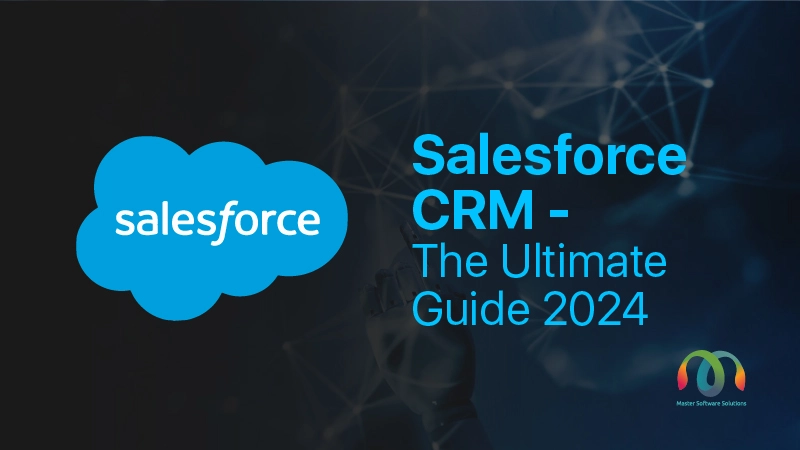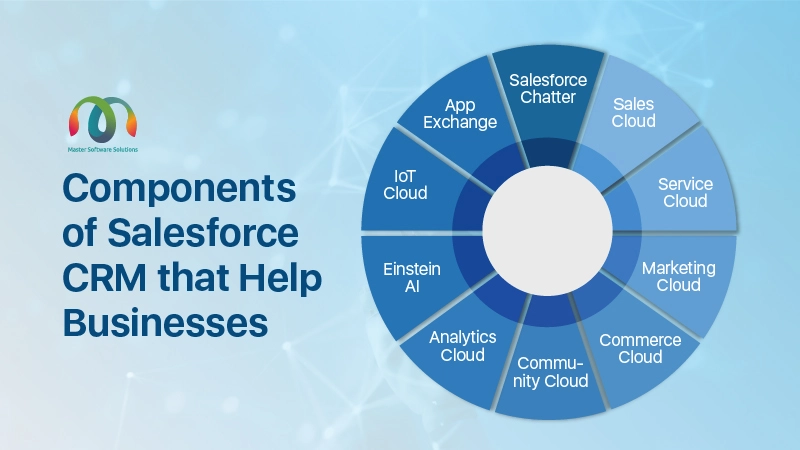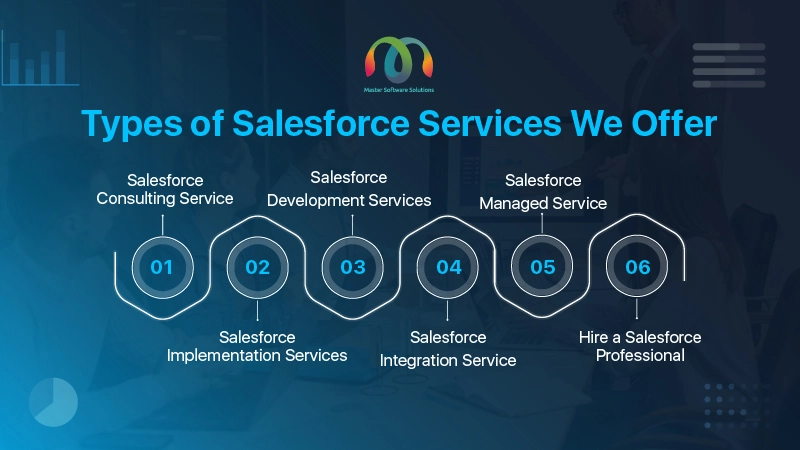Salesforce CRM – The Ultimate Guide 2024
The Salesforce Customer Relationship Management (CRM) platform pioneers the revolution in customer and stakeholder relationship management. “The Ultimate Guide to Salesforce” is a comprehensive roadmap for businesses starting their Salesforce journey or looking to optimise their current platform.
The article will cover:
- What is customer relationship management?
- Challenges faced in customer relationship management
- Measures to tackle with Customer relationship management challenges
- What is Salesforce?
- How does Salesforce CRM implementation help?
- The process of implementing Salesforce
- Ways to implement Salesforce
- Benefits of opting for Salesforce implementation partner
- Types of Salesforce implementation Services
- Salesforce services that we provide
- Tips to guarantee successful adoption of salesforce
- The best time to invest in the Salesforce
- Use- cases of Salesforce (CRM)
What is customer relationship management?
Customer relationship management (CRM) is a blend of strategies and technology to analyse customer interaction throughout it’s lifecycle to create and maintain customer relationships. The goal of customer relationship management is to retain customers and improve ROI.
CRM collects data from multiple channels of customer’s interactions with the company, which includes live chat, website, telephone, direct mail, and marketing material. Advanced CRM can also collect data on the personal information of the customer, like their purchasing history, concerns and buying preferences.
Challenges faced in customer relationship management
- Disorganised customer data – Lack of a suitable system makes it difficult to access and maintain data accuracy.
- Limited visibility into customer interaction – Relationships are hampered without tracking and analysing customer interactions.
- Manual and time-consuming processes – Without Salesforce, the process is labor-intensive, error-prone manual data entry.
- Ineffective communication and collaboration – Communication among sales, marketing, and customer service teams can lead to misalignment and missed opportunities.
- Difficulty in forecasting and reporting – Ineffective data analysis and reporting tools make it difficult to generate actionable insights.
- Missed growth opportunities – Companies may miss out on potential sales opportunities without CRM.
- Inefficient customer support – Providing efficient customer support is challenging without CRM.
- Security and compliance risks – Data in different systems can pose security risks, making it difficult for companies to protect customer information.
- Inability to scale and adapt – Handling loads of data for a growing company is a challenge without a scalable CRM.
Measures to tackle with Customer relationship management challenges
Here are the measures you can implement to achieve success in establishing customer relationships:
- Automate funnel process – You should be able to automate the funnel process for potential clients.
- Accessibility – The platform can be a cloud-based tool that makes it accessible anywhere and anytime.
- Data management – The platform must help in managing the data easily.
- Personalised experience – The system should be able to improve customer relations by directly contacting.
- Accounting feature – The platform should help understand the needs of customers and assist in improving revenue.
- Data analytics – It must be able to collect data from multiple channels and represent it in form of analytics.
- Chatter – It is an internal messaging feature that allows the team to connect and collaborate.
There are a number of CRM platforms that companies use to mitigate the challenges faced in customer relationship management, like Salesforce CRM, HubSpot, Deskera, and Zoho. In this article, we’ll discuss the ins and outs of the Salesforce CRM platform in detail.
What is Salesforce (CRM)?
It is a cloud-based customer relationship management (CRM) system that has various products (service cloud, sales cloud, revenue cloud, marketing cloud, etc.) designed for customer service support, sales and marketing. This helps in increasing sales efficiency, winning more deals, and improving forecast efficiency.
You can have a complete overview of your business operations, finances, marketing, sales, etc. on the dashboard of the Salesforce platform. The companies can also track the activities of the customers and provide them with personalised experiences.
Components of Salesforce CRM that help businesses
- Sales cloud – Lead management, opportunity tracking, pipeline management, contact management, sales forecasting, and other functions are all included in the Salesforce sales cloud.
- Service cloud – In order to deliver effective and individualised customer care, it has automation tools.
- Marketing cloud – This uses multiple channels, like email marketing or social media marketing, to deal with marketing automation.
- Commerce cloud – It helps in managing different aspects of ecommerce and provides custom shopping experiences.
- Community cloud – This component makes it possible to create branded online communities.
- Analytics cloud (Einstein Analytics) – Uses AI and machine learning to examine data in Salesforce from a variety of sources.
- Einstein AI – Uses machine learning, natural language processing, predictive analytics, and automation to make predictive assumptions.
- IoT cloud – It assists with gathering, analysing, and responding to data from different connected devices.
- AppExchange – Users can locate and install third-party apps and add-ons from Salesforce Marketplace.
- Chatter – Salesforce Chatter is an internal communication and knowledge sharing tool that allows staff members to connect within the platform.
The process of implementing Salesforce
The Salesforce implementation process mainly depends on the type of organisation. Sticking to healthy practises while implementing the platform ensures a successful Salesforce implementation.
- Identify stakeholders – It is crucial to identify people and organisations who are interested in your project (organisations whose needs will be fulfilled with the implementation).
- Goals – Define your goals based on what success seems like to you, pain areas of your team, what daily task are inefficient, etc.
- Functionalities – Prioritise functionalities that are required by the system to fulfil your target. Assign priorities to the requirements as high, medium and low.
- Budget and timeline – Estimating the timeline of the task is the work or ark and science basis on which the budget is determined.
- Risk management – Consider the size of the company, data volume, and customisation to estimate optimistic, pessimistic and most likely implementation scenarios to anticipate risk and unexpected outcomes.
- Metrics – Define metrics like an increase in lead flow, improved revenue, low churn rate, increased customer satisfaction score, accuracy rate, etc. to measure success.
- Clear communication – Establish clear and transparent communication among implementors, stakeholders and internal teams.
- Consider dependencies – Begin building the platform according to the prioritised tasks and consider the dependencies of the functionalities on each other.
- Cross check – Make sure that the expectations meet reality.
- Seamless process – Ensure that the transition process to adopting the platform is smooth and hassle-free.
- Follow outline steps – Follow steps outlined in pre-deployment, deployment and post-deployment.
Ways to implement Salesforce:
- In-house implementation – This is when the business implements the CRM on its own. This is neither preferred nor recommended by many organisations.
- Third-party implementation – It refers to collaborating with a service provider who assists with CRM implementation. Third-party implementation can be both costly and rewarding.
- Hybrid implementation – This approach entails hiring implementation partners for some of the integration that the organisation is unsure of.
Benefits of Opting for Salesforce implementation partner
- Expertise -The implementation partners have partners who are experts and professionals who have in-depth knowledge about the platform. Every business has a unique need and its consultants can help you design the platform as per the needs of your business.
- Best practise – Having a partner who listens to your needs and follows the best practises while implementing the platform.
- Customisation – The experts understand the needs and customise the platform according to the requirements, which is not possible while implementing yourself.
- Support – Opting for a CRM implementation partner gives 24*7 access to customer support in case of any issue.
- Cost-effective – Implementing the platform yourself can lead to technical debt, which can significantly impact your financials. It is better to opt for CRM implementation experts to avoid such losses.
Types of Salesforce implementing services
- Full implementation – This includes complete installation, configuration, and customisation of the Salesforce platform.
- Partial implementation – This type of implementation includes a subset of tasks that are included in the implementation of Salesforce.
- Managed services – This includes ongoing support and maintenance that is required to keep the data in Salesforce clean and up-to-date.
Types of Salesforce services you can opt for
- Salesforce consulting services – It refers to the professional guidance and advice provided on how to use Salesforce products to meet specific business needs.
- Salesforce implementation services – It is the process of setting up Salesforce products—like CRM—to meet an organization’s needs.
- Salesforce development services – This process results in the creation of custom apps, integrations, or functionalities inside the Salesforce ecosystem.
- Salesforce integration services – It the process of integrating Salesforce with other databases, systems, or programmes from third parties.
- Salesforce managed services – In order to guarantee continuous functioning after implementation, managed services for Salesforce are needed.
- Hire a Salesforce professional – It means bringing in specialists to work on Salesforce-related projects, offer advice, or cover specific responsibilities within an organisation that require Salesforce knowledge.
Salesforce implementation services
These are the services we provide for Salesforce implementation:
- Salesforce service cloud – Service cloud is a CRM platform for customer service representative teams. The platform offer Einstein AI to chat to the customer which based on the query assigns the right customer service representative. This automates and streamlines the process workflow.
- Salesforce sales cloud service – The sales cloud automates all the sales activities allowing businesses to track their prospects, deals, and deals conversion rates. The platform is integrated to the website which allow deal creation once the customer has filled the form. Automating the sales process reduces the deal life-cycle, allowing the business to increase their efficiency and productivity.
- Salesforce marketing cloud service – Marketing Cloud is a digital marketing automation and analytics platform. To engage customers across multiple channels, it provides tools for email marketing, social media marketing, advertising, customer journey mapping, analytics, and personalisation.
- Salesforce community cloud service – Community Cloud makes it possible to create branded online communities for connecting and collaborating with customers, partners, and employees. It has features for discussion forums, knowledge sharing, and collaboration.
- Salesforce financial service cloud – Financial Services Cloud is designed specifically for the financial services industry. It provides tools for wealth management, banking, insurance, and other financial services to build deeper client relationships and deliver personalised experiences.
- Salesforce non-profit cloud service – Non-profit cloud is intended for charitable organisations. To effectively support their missions, it includes fundraising tools, donor management, volunteer management, program management, and constituent engagement functionality.
- Salesforce CPQ service – Salesforce CPQ is a sales tool that allows you to generate accurate quotes and configure pricing based on product and service configurations. It improves sales efficiency and accuracy by automating complex quoting processes.
- Salesforce Chatter service – Chatter is a Salesforce collaboration tool that allows employees to communicate, share files, and collaborate. It acts as a social network within an organisation, encouraging internal collaboration and knowledge sharing.
Tips to guarantee successful adoption of salesforce
- Hire a certified Salesforce expert– To ensure implementation success, it is important to hire a certified Salesforce implementation company.
- Stay flexible – There can be changes in plan as the implementation starts and you start learning new and more advanced features. You need to be flexible in adopting other plans and revising the errors in the plan.
- Prioritise communication – Clear and transparent communication is very important to remain on the same page. Keep the employees engaged in the process, which makes them feel worthy and creates a more comprehensive platform.
- Offer a variety of training options and resources – Training is one of the most important parts of CRM implementation. This includes classroom training, online training or providing the users with ebooks or tutorial videos.
The best time to invest in the Salesforce
- If you want to work faster and improve efficiency, you can save time by automatically assigning the right agents via CRM.
- If you want to improve lead generation, nurture leads, and monitor the activities of customers,
- Get complete visibility of customer interactions on a single screen.
- Get detailed analytical details, which help businesses track their businesses. Such analytics help predict and make better future business decisions.
- Help save time on administrative tasks, allowing you to focus on more important things
- Allows businesses to communicate with and respond to customers through various channels to understand customer requirements and improve customer experience.
- Make sure the solution you choose is adaptable enough to meet your company’s future needs. It should allow you to change and modify its capabilities so that it can grow with you.
- The system offers Enstien recommendations, which is an AI powered tool that gives suggestions based on past and historical data.
- The tool is cloud-based which allows businesses to access the system anytime and from anywhere, which ensures that the business works efficiently.
Use- cases of Salesforce
Salesforce CRM is used in a wide range of industries to maintain data and help in customer service support, sales and marketing. These industries include – Automotives, communications, consumer goods, financial services – (banking, Insurance and asset management), government, healthcare, life-science, higher education, manufacturing, media, non-profit, retail, and transportation and hospitality.
Navigating the CRM ecosystem requires a blend of strategic planning, technical expertise, and a detailed understanding of business needs. This guide has given a clearer idea of how to set up the system, from the initial assessment phase to implementation, prerequisites, and benefits of opting for Salesforce development services.
Read More: Logistics company, improved last-mile business operations with Salesforce – Use Cases
Need support in implementing Salesforce?
Master Software Solution is one of the leading CRM development companies with over 9 years of experience in the IT sector. Book a meeting with our Salesforce implementation experts to discuss your business requirements and see how we can help you.


